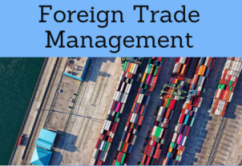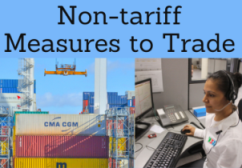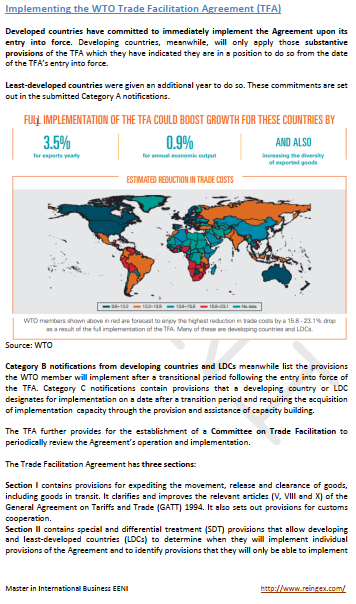Trade Facilitation Agreement

Trade Facilitation Agreement (TFA) of the World Trade Organization (WTO)

- Introduction to the Trade Facilitation Agreement (TFA) of the World Trade Organization (WTO)
- Fundamentals of the Trade Facilitation Agreement
- Substantive provisions
- Provisions for special and differential treatment for developing and least developed countries
- Institutional provisions and final provisions
- Annual report on the WTO Trade Facilitation Agreement
- Implementation of the WTO Trade Facilitation Agreement
- Strategy of the Mercator program of the World Customs Organization
- Legal text of the WTO Trade Facilitation Agreement
The objectives of the subject «Trade Facilitation Agreement (TFA)» are the following:
- Understand the pillars of the WTO Trade Facilitation Agreement (TFA)
- Know the concepts of substantive provisions in the scope of the Agreement on Trade Facilitation
- Analyze the provisions on special and differential treatment for developing and least developed countries

The Subject «Trade Facilitation Agreement (TFA)» belongs to the following Online Programs taught by EENI Global Business School:
Courses: Foreign Trade Management, Foreign Trade Assistant, Non-tariff Measures to Trade.

Logistics Courses: International Transport, Maritime Transport, Multimodal, Road, Rail, Transport in Africa.
Diplomas: Foreign Trade, International Transport.

Masters: International Business, Foreign Trade, International Transport, Transport in Africa.
Doctorate: Global Logistics, World Trade.
Languages:  or
or  Accord sur la facilitation des échanges (AFE)
Accord sur la facilitation des échanges (AFE)  Acuerdo sobre Facilitación del Comercio (AFC)
Acuerdo sobre Facilitación del Comercio (AFC)  Acordo de Facilitação do Comércio.
Acordo de Facilitação do Comércio.

WTO Trade Facilitation Agreement (TFA).
With the Trade Facilitation Agreement (TFA), the WTO members established a new legal framework for the necessary reforms to be implemented for trade facilitation. It was created in the 2001 Doha Round.
The objective of the Trade Facilitation Agreement (TFA) of the WTO is to establish a legal framework that allows the reform of trade facilitation at a global level, speeding up the movement, release and customs clearance of products.
The substantive obligations of the Trade Facilitation Agreement (TFA) include the obligation to publish as well as access to information, appeal channels, trade procedures simplification, customs clearance processes, cross-border customs cooperation among the institutions that operate at the border, the reduction of non-tariff measures, the use of information technologies...
Also included provisions related to special and differential treatment of the Trade Facilitation for least developed countries (LDCs) and developing countries (LDCs), including technical assistance.
Sample - Trade Facilitation Agreement (TFA):

The WTO has other agreements related to trade facilitation:
- Agreement on Customs Valuation
- Preshipment Inspection
- Agreement on Preshipment Inspection
- Agreement on Rules of Origin
See also:


